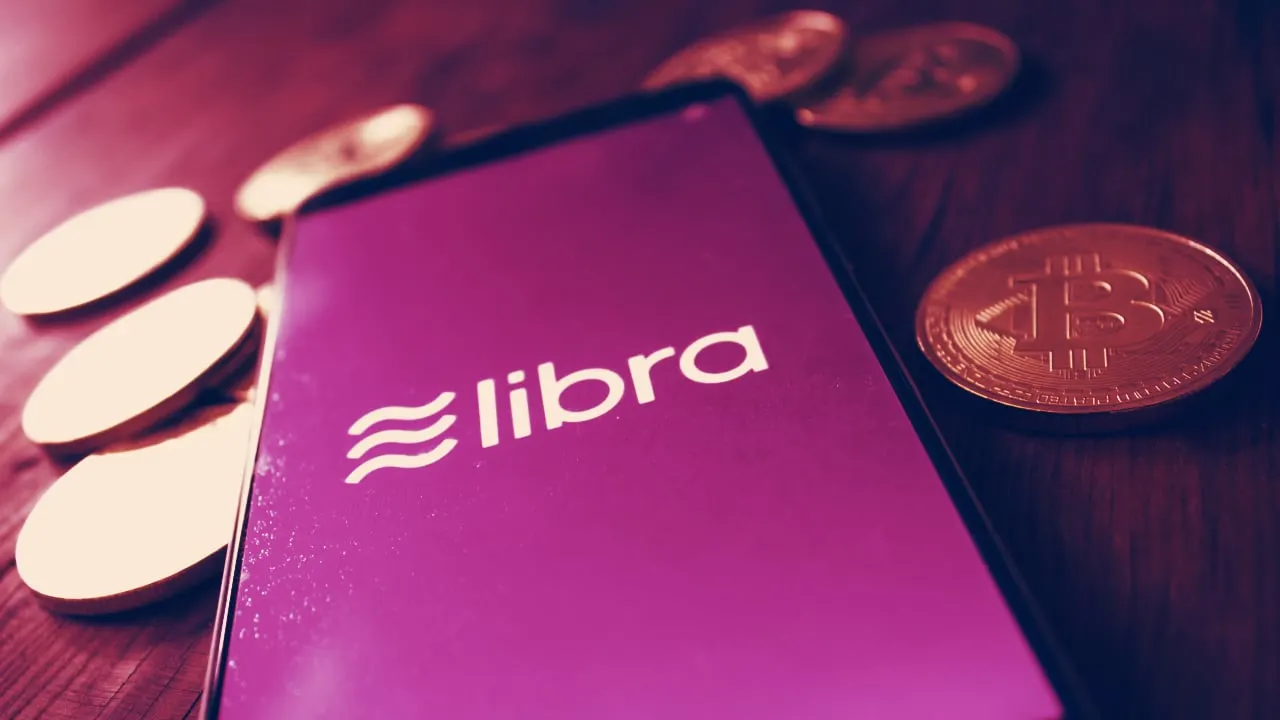The council of the Libra Association appoints an independent Technical Steering Committee to govern technical development for the Libra project. Meet the members: @diogomonica @JoeLallouz @ricoflan @nickgrossman @gc3tweets https://t.co/ytQj1NJKAf
— Libra Dev (@LibraDev) January 17, 2020
Coin Prices
BTC
$68,120.00
2.32%ETH
$2,070.22
4.93%XRP
$1.44
1.43%BNB
$628.13
2.30%USDC
$0.999913
0.00%SOL
$87.86
4.05%TRX
$0.286714
0.31%DOGE
$0.099081
0.98%FIGR_HELOC
$1.032
-0.20%WBT
$50.85
2.32%ADA
$0.293057
3.72%USDS
$0.999908
-0.00%BCH
$493.98
-3.19%LEO
$8.74
0.60%HYPE
$29.03
3.88%LINK
$9.24
3.08%XMR
$343.47
1.60%CC
$0.165416
3.11%USDE
$0.999221
-0.08%XLM
$0.163841
2.97%USD1
$0.999325
-0.01%RAIN
$0.00957396
2.54%HBAR
$0.103057
2.38%LTC
$56.27
1.16%PYUSD
$0.999972
0.02%ZEC
$243.87
-0.12%AVAX
$9.35
-0.45%SUI
$0.946371
2.92%SHIB
$0.00000609
-1.35%WLFI
$0.116775
0.84%CRO
$0.078097
0.61%TON
$1.29
-0.60%XAUT
$5,149.19
-0.29%DOT
$1.61
9.10%UNI
$3.95
5.73%PAXG
$5,181.08
-0.36%M
$1.39
-2.17%MNT
$0.650862
6.46%BUIDL
$1.00
0.00%USYC
$1.12
0.00%TAO
$184.17
2.71%USDF
$0.997266
-0.03%AAVE
$114.64
-3.09%ASTER
$0.704699
0.26%PEPE
$0.00000398
-3.40%OKB
$78.66
2.39%USDG
$1.00
0.01%SKY
$0.069873
2.79%PI
$0.16964
0.05%BGB
$2.24
0.07%RLUSD
$0.999697
-0.03%HTX
$0.00000162
-2.36%NEAR
$1.13
4.93%ETC
$8.95
0.98%ICP
$2.42
8.39%BFUSD
$0.999338
-0.03%ONDO
$0.271033
2.07%POL
$0.111395
-2.95%WLD
$0.405549
0.66%KCS
$8.67
0.48%USTB
$11.00
0.01%GT
$7.20
1.78%PUMP
$0.00181118
-0.16%MORPHO
$1.86
-4.32%NIGHT
$0.058771
2.58%ATOM
$1.92
-7.86%QNT
$65.02
1.12%HASH
$0.01663717
-1.85%ENA
$0.108796
4.92%KAS
$0.03281313
6.90%NEXO
$0.863146
0.90%PIPPIN
$0.872158
18.25%USDTB
$1.00
0.15%FLR
$0.00974899
-0.57%TRUMP
$3.51
0.75%ALGO
$0.08981
0.66%EUTBL
$1.24
0.20%RENDER
$1.47
1.77%USDD
$1.00
-0.00%FIL
$1.005
0.54%OUSG
$114.41
0.01%APT
$0.965131
6.75%STABLE
$0.03404386
9.16%JAAA
$1.027
0.00%USDY
$1.13
1.78%XDC
$0.03552366
4.49%VET
$0.00763763
0.86%BDX
$0.080264
-0.30%ARB
$0.099417
2.50%JTRSY
$1.096
0.01%USD0
$0.998091
0.02%DCR
$32.16
13.00%JUP
$0.157866
3.23%BONK
$0.00000627
1.83%GHO
$1.00
0.01%A7A5
$0.01286741
-0.05%TUSD
$0.999024
-0.05%STX
$0.263383
3.94%SEI
$0.070837
1.09%FTN
$1.087
-0.02%KITE
$0.259481
-5.94%USDAI
$1.00
0.01%EURC
$1.18
0.21%VIRTUAL
$0.697095
-0.84%POWER
$2.09
136.15%PENGU
$0.00706797
0.21%DASH
$34.93
2.06%CAKE
$1.31
-0.13%XTZ
$0.392618
0.75%JST
$0.04699303
3.99%KAU
$166.25
-0.33%ETHFI
$0.512674
-2.97%FDUSD
$1.00
-0.02%CRV
$0.255622
3.54%CTM
$0.085367
3.25%FET
$0.163103
-0.07%LIT
$1.46
0.75%IP
$1.019
-0.46%USX
$0.999713
-0.00%GNO
$130.36
3.01%AERO
$0.367924
6.83%PRIME
$1.02
0.07%BTT
$0.00000034
2.27%CHZ
$0.03215653
-8.04%KAIA
$0.056867
2.54%NFT
$0.00000033
0.10%BSV
$16.30
-0.50%INJ
$3.20
-1.69%ADI
$3.22
0.85%ZRO
$1.55
1.05%SUN
$0.01616726
-2.57%PYTH
$0.052604
-1.47%IOTA
$0.070129
0.96%SPX
$0.323277
5.49%TIA
$0.339508
1.58%JASMY
$0.00606601
3.64%CRVUSD
$0.996641
-0.32%GRT
$0.02698056
-1.03%FLOKI
$0.00002957
-0.52%SYRUP
$0.239958
5.54%OHM
$17.64
2.27%FRAX
$0.991392
0.17%LDO
$0.319505
0.92%2Z
$0.077408
6.22%SIREN
$0.365584
0.11%CFX
$0.050816
-0.54%HNT
$1.40
0.71%OP
$0.12263
1.42%BTSE
$1.59
-1.35%TEL
$0.00265475
0.97%H
$0.136762
3.28%ENS
$6.38
-0.13%AB
$0.00245703
-1.08%STRK
$0.04422614
1.62%MON
$0.02152606
3.83%AXS
$1.36
0.66%UDS
$1.83
4.02%SAND
$0.085735
2.30%NUSD
$0.998851
0.02%XPL
$0.098939
8.37%YLDS
$0.999996
0.00%USDA
$0.985431
-0.32%AUSD
$0.999825
-0.01%USTBL
$1.075
0.01%PENDLE
$1.29
-0.00%WIF
$0.213258
2.54%RIVER
$10.80
17.54%ZBCN
$0.00215422
-1.63%BCAP
$22.79
0.00%APEPE
$0.00000098
2.88%TWT
$0.493487
-3.75%FT
$0.099599
0.17%LUNC
$0.00003643
0.18%NEO
$2.79
1.89%ULTIMA
$5,154.95
-2.37%BORG
$0.198013
-1.53%THETA
$0.193687
2.28%TIBBIR
$0.193233
6.71%BARD
$0.854358
11.33%VSN
$0.053329
1.04%PC0000031
$1.00
0.00%MANA
$0.096665
1.06%FF
$0.079293
1.23%XCN
$0.00491684
-0.17%VVV
$4.11
-5.19%ZK
$0.01977734
-0.83%FDIT
$1.00
0.00%GALA
$0.00378137
4.05%COMP
$18.46
0.26%IUSD
$1.00
0.01%SENT
$0.02385368
2.80%BAT
$0.114528
-6.42%REAL
$0.054487
2.73%FARTCOIN
$0.16922
3.45%CVX
$1.85
-2.07%RAY
$0.621598
-1.24%FLUID
$2.12
2.28%9BIT
$0.02017185
0.33%MX
$1.80
0.11%WFI
$2.05
-6.18%KOGE
$48.00
0.00%SATUSD
$0.994825
4.93%XEC
$0.00000783
0.33%EURS
$1.26
-0.32%DEXE
$3.32
4.47%S
$0.04111448
-1.16%GUSD
$1.001
-0.02%TRAC
$0.333878
6.53%USDF
$0.999211
0.10%GLM
$0.14498
-4.47%IMX
$0.169129
-1.18%RUNE
$0.410258
0.37%THBILL
$1.013
-0.22%0G
$0.660335
1.38%WEMIX
$0.304326
0.37%B
$0.134243
8.20%1INCH
$0.095623
2.52%EGLD
$4.55
-0.66%COCO
$0.133717
4.13%A
$0.081629
-1.19%BERA
$0.612749
-0.65%ACRED
$1,096.64
-0.10%SFP
$0.260333
-0.82%RLB
$0.074236
-3.35%GOMINING
$0.314262
-0.82%MWC
$11.45
3.90%KTA
$0.254273
-2.21%WAL
$0.077945
0.67%AMP
$0.00148491
0.54%COW
$0.222226
0.72%LION
$0.00406344
1.50%SNX
$0.36186
-3.66%JTO
$0.28088
-2.42%OZO
$0.130541
0.16%SKR
$0.02144421
-3.05%GRX
$12.84
11.71%PUSD
$1.001
0.00%EIGEN
$0.199638
1.68%FOGO
$0.03145111
13.35%UB
$0.04680128
12.41%QRL
$1.51
3.64%LPT
$2.35
-1.41%GRASS
$0.240418
23.93%DOLA
$0.995618
0.04%BAN
$0.114405
-2.46%FRXUSD
$1.00
0.02%BMX
$0.332746
-0.73%REUSD
$1.063
0.04%
